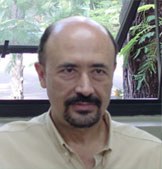Luciano Vieira Dutra | Pesquisador Titular III (aposentado)
Pós-Doutorado: Radar Image Processing, University of Sheffield, 1991
Doutorado: Computação Aplicada, INPE - Instituto Nacional de Pesquisas Espaciais, 1989
Mestrado: Computação Aplicada, INPE - Instituto Nacional de Pesquisas Espaciais, 1982
Graduação: Engenharia Eletrônica, ITA - Instituto Tecnológico de Aeronáutica, 1976
Linhas de Pesquisa: Processamento de Imagens
Lattes: lattes.cnpq.br/9840759640842299
Email: dutra@dpi.inpe.br
Prédio: SERE II, piso superior
Sala: 44
Ramal: 6514
Biografia:
Dr. Luciano Vieira Dutra was born in Sao Paulo, Brazil. He received the B.S.E.E degree, in 1976, from Aeronautical Technological Institute (ITA), Brazil, and the M.Sc. and Ph.D. degrees in Computer Science from the Brazilian National Institute for Space Research (INPE), in 1981 and 1989 respectively. He was a Visiting Scholar at Sheffield University in 1991. Also, he went to the German Space Establishment (DLR) in 1995, 1997, 1998 and 1999 as a Visiting Scientist, to work with radar imagery information extraction. Since 1977, he has been with the Brazilian Institute for Space Research (INPE) where he is, currently, a Senior Researcher at the Image Processing Division (DPI). He has been working in several national and international large scale remote sensing projects. His areas of interest includes SAR image processing, pattern recognition and remote sensing applications. He is currently a Principal Investigator of the CsF - PVE project "Integration of Multi-sensor and Multi-scale Remote Sensing Data for Examining Land Use/Cover Disturbance at a Regional Scale in the Brazilian Amazon" funded by CNPq. He is also a lecturer at INPE´s Computer Science and Remote Sensing Graduate Programs, where he has been in charge of Pattern Recognition and Radar Image Processing Courses. From 2000 to 2005 he stayed as Visiting Researcher at Universidade Federal de Minas Gerais sponsored by CNPq, National Research Council of Brazil and FAPEMIG.


